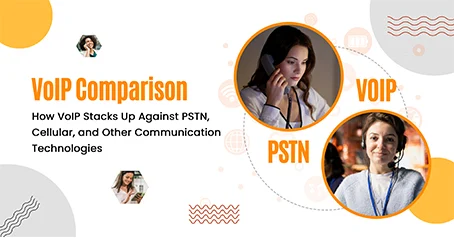Two relevant terminologies that come into play in the rising world of VoIP (Voice over Internet Protocol) and wholesale voice termination are CLI (Caller Line Identification) and NCLI (Non-Caller Line Identification). These terms describe the kind of voice traffic being routed and have an overall impact on call quality, cost and compliance. Essentially, knowledge of CLI and NCLI in VoIP can aid the business in enhancing the telephony infrastructure along with its statutory compliance.
CLI and NCLI in VoIP: What You Should Know
What is CLI (Caller Line Identification)?
CLI (Caller Line Identification) is a service that allows the recipient to see who the caller is by displaying his phone number to them. This feature improves transparency, trust, and security in communications. CLI routes also ensure that calls are carried with authenticated and visible caller ID so that they can connect better and comply with telecommunication regulations.
What is NCLI (Non-Caller Line Identification)?
NCLI, which means Non-Caller Line Identification, is a call with a caller ID that is missing. This can be commonly seen with bulk voice termination, such as for call centers, marketing campaigns, and enterprises needing flexibility in their outbound voice communication. NCLI is affordable but may be restricted in some countries due to its regulatory nature.
Differences Between CLI and NCLI
|
Feature |
CLI (Caller Line Identification) |
NCLI (Non-Caller Line Identification) |
|
Caller ID |
Displays the caller’s number |
No caller ID is displayed |
|
Call Quality |
High-quality, stable connections |
May have lower quality in some cases |
|
Regulatory Compliance |
Fully compliant with telecom regulations |
May face restrictions in some countries |
|
Use Cases |
Business communication, verified calls, customer service |
Bulk call termination, call centers, marketing campaigns |
|
Pricing |
Higher cost due to premium quality |
More cost-effective |
Importance of NCLI and CLI in Wholesale Voice Termination
In VoIP, wholesale voice termination routes calls through international and domestic carriers to reach the end recipient. CLI vs NCLI in wholesale voice termination has several implications:
1.Call Quality & Reliability
- CLI route will provide a better quality call with fewer breakups.
- The quality of calls may be a mixed bag depending on which NCLI route is being used, though they tend to be less expensive than traditional PSTN routes.
2.Cost Considerations
- CLI roles have a higher cost due to the availability of verified caller ids and better route quality.
- NCLI services are inexpensive and thus are best suited to organizations that place a large volume of calls but have little cash flow.
3. Compliance with laws and restrictions
- To reduce fraud and facilitate traceability, in many jurisdictions, CLI is required for outbound VoIP calls.
- Due to some security issues, NCLI traffic is blocked or limited in some regions.
4.Business Use Cases
- CLI routes are ideal if you are in the customer service, financial institutions, healthcare, or legal industries where authenticity matters.
- Call centers, telemarketing firms and mass communication services use NCLI routes to minimize costs.
Final Thoughts
CLI (CLI) & NCLI (NCLI) in VoIP & wholesale voice termination. CLI ensures transparency, compliance, and high call quality—while NCLI can be more cost-effective and flexible for businesses making a high volume of calls. Organizations can make educated choices on how to improve their VoIP communication policy while remaining in compliance with regulations and optimize costs by identifying the distinctions and benefits of each.







